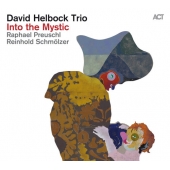
Helbock David Trio
Into The Mystic
Label: Act
Genre: Jazz / Avant Garde
Availability
- CD Digi / Cardboard €18.49 In Stock
“Musicians can’t really invent anything completely new,” says the 32-year old Austrian-born pianist David Helbock. “What we can do is to take ideas, and add something of ourselves. When things are working well, what emerges from that is something really exciting.” Helbock belongs to the generation of jazz musicians who are heading off in their own individual directions, pushing the boundaries, radically re-configuring our understanding of what old and new music is, re-aligning composition and improvisation, and challenging common pre-conceptions about style and personality.
“These days jazz musicians often take pop songs as their point of departure,” says Helbock. “Speaking frankly, it doesn’t matter what you cover, whether it’s pop, classical music, world music - whatever. But what does matter is what you then make of it.” The press has seen the force of that argument when it has tried to define Helbock himself: the German cultural TV channel 3sat, for example, called him “an extremely adept manipulator of sound and an experimenter whose sensitivities are those of the here and now” and the respected Munich broadsheet paper Süddeutsche Zeitung described him as a “shooting star of the European scene.” “Into the Mystic,” his ACT label debut is another important step in establishing that profile.
Helbock draws on a wide range of sources of inspiration to make his music. Incidents in everyday life and nature are in there, but also a wealth of musical influences, and written texts of all kinds. “My experience of life outside music have always been an influence on my music,” he remarks. “I always knew that just putting a few interesting crotchets and quavers together in a row was never going to be enough for me.”
That is an approach which runs right through his musical life to date. He began the piano as a six year-old in the mountainous Austrian region of Vorarlberg. At twelve he attended the jazz seminar in Dornbirn, but he pursued his tertiary education as a classical pianist, going right through to Diploma level. “After that, I found the perfect teacher, New York pianist Peter Madsen. “It was insane, he was just right for my jazz education, nourishing me with every musical style you can imagine, and art and philosophy. I could then look around in all that for what intuitively suited me.” Since that time, Helbock has taken this authentic spirit of improvisation, followed it through, and developed it for himself in several forms with clear and coherent structures.
Very few young pianists can have quite the level of work-rate and productivity as Helbock. In around 2010 he published the 600-page “My Personal Realbook” a kind of musical diary written over a year, during which he composed a new piece every day. By 2013 he had recorded more than ten albums in all kinds of ensembles, of which those with his Trio Random/Control have had the most impact. This group (with two multi-instrumentalist wind players) has made its mark by traversing all kinds of musical styles with an iridescent unpredictability – and a sense of humour.
Now, however, the musical storyteller Helbock feels he has reached the point when it is right to tie all these threads together, and to concentrate on the mystical heart of what it is to make music. In this trio recording with Raphael Preuschl, on the very rare bass ukelele, and Reinhold Schmölzer on drums, Helbock is adventuring “Into the Mystic” on several levels. The album is enriched by all kinds of mythology, from sagas about the gods of ancient Greece, to the cosmology of the earth, and a multitude of literary, filmic and artistic inspirations.
Helbock proceeds here in a very different way from in his earlier sometimes wild experiments, which occasionally took him in the direction of electronica. Here his compositions are a tapestry of dreams. He stays true to the dictum of the American professor of mythology Joseph Campbell: “Myths are public dreams; dreams are private myths.” Campbell’s exegesis of the universal structures and the local particularities of myths were a decisive influence on George Lucas’s “Star Wars” saga, and Helbock has made four tracks which incorporate the well-known music from the films by John Williams into the backbone of the album. Around this, Helbock, Preuschl und Schmölzer have woven, in their subtle and virtuosic way, tales of gods, heroes and miracles. It is sometimes lyrical, sometimes hymnic, but there is always an element which will take the listener by surprise.
That is certainly true for the touching ballad “Eros” dedicated to the Greek goddess of love; or indeed of “Spiritual Monk,” Helbock’s simple and straightforward homage to his hero Thelonious Monk, which is overlaid with complex ideas; or the secretly shimmering title track. Perhaps the most captivating piece on the album is “The Soul,” in which Helbock has taken a mystical story by the 14th century Persian Sufi poet Hafez, which describes how at the time of the creation of humanity, the soul was imprisoned in the body through the agency of music.
“One can try to reach a rational understanding of music, or one can engage the emotions - and just love it,” says Helbock. “Music has that capacity to take a mysical hold of us at the point where words end. One of my objectives was to track down the mystery inherent in music.” The listener gains a sense of what Helbock means by that from the very first solo foray with which he starts this album. He has taken the haunting processional theme of the second movement in Beethoven‘s Seventh Symphony, and brought out its essence by surrounding it with the interplay of chords in the bass and muffled overtones. As in many other instances on this album, the mystical becomes the magical.
